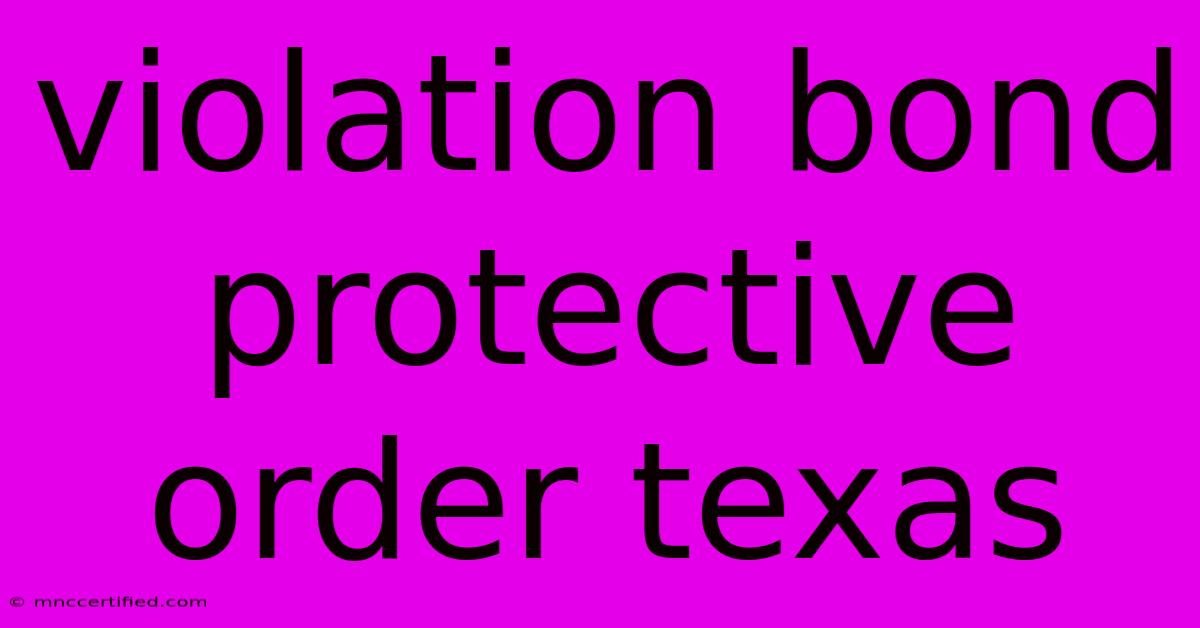Violation Bond Protective Order Texas

Table of Contents
Understanding Violation Bond Protective Orders in Texas
A Protective Order in Texas is a legal document issued by a court to protect a person from harm or abuse. These orders are typically granted in cases of family violence, stalking, or sexual assault. Violation Bond Protective Orders specifically address the situation where someone violates the terms of a previously issued protective order. This article will guide you through the intricacies of Violation Bond Protective Orders in Texas, providing you with crucial information on their purpose, consequences, and relevant legal procedures.
What is a Violation Bond Protective Order?
When someone breaks the terms of a Protective Order, they can be arrested and charged with a criminal offense. In such cases, the court might set a bond to ensure the individual's appearance in court for the violation charge. This bond is known as a Violation Bond Protective Order.
The Purpose of Violation Bond Protective Orders
These orders are put in place to:
- Protect the victim: By ensuring the accused individual doesn't flee or pose a further threat.
- Ensure compliance: Serving as a deterrent to further violations of the original Protective Order.
- Facilitate legal proceedings: By securing the accused's presence in court.
How are Violation Bond Protective Orders Issued?
When a person is arrested for violating a Protective Order, the judge will determine if a Violation Bond Protective Order is necessary. If granted, the judge will set a specific amount of money, known as the bond amount. The accused must pay this bond to be released from custody. Failure to pay the bond will result in continued detention.
Consequences of Violating a Protective Order
Violating a Protective Order in Texas is a serious offense with significant consequences. Depending on the circumstances, the offense can be categorized as:
- Class A Misdemeanor: This is the most common charge for first-time violations. It carries a possible penalty of up to one year in jail and a fine of up to $4,000.
- Felony: Repeat violations or violations involving serious harm can be charged as felonies, resulting in much heavier penalties including longer jail sentences and substantial fines.
Steps to Take If You are Served with a Violation Bond Protective Order
If you are served with a Violation Bond Protective Order, it's crucial to understand the gravity of the situation. Here are essential steps you should take:
- Seek Legal Counsel: Contact an experienced criminal defense attorney immediately. They can help you understand your rights and options.
- Don't Talk to the Police: It's essential to exercise your right to remain silent until you have legal representation. Any statements you make can be used against you.
- Understand the Terms: Thoroughly read the Violation Bond Protective Order to understand its terms and restrictions.
- Appear in Court: Make sure to appear in court on the scheduled date and time. Failure to do so could result in additional charges.
Key Considerations for Violation Bond Protective Orders in Texas
- The original Protective Order: The specific terms of the original Protective Order will dictate the nature of the violation.
- Intent: The prosecution must prove that the accused intentionally violated the Protective Order.
- Communication with the victim: Certain forms of communication, even if non-threatening, might be considered violations.
Conclusion
Understanding Violation Bond Protective Orders is vital for anyone involved in a legal case involving a Protective Order. This information highlights the legal ramifications and crucial steps to take when faced with such an order. Remember, consulting with a qualified criminal defense attorney is essential to navigate these complex legal situations and protect your rights.

Thank you for visiting our website wich cover about Violation Bond Protective Order Texas. We hope the information provided has been useful to you. Feel free to contact us if you have any questions or need further assistance. See you next time and dont miss to bookmark.
Featured Posts
-
Best Travel Insurance For New Zealand
Nov 10, 2024
-
5 Takeaways Minnesotas Loss To Rutgers
Nov 10, 2024
-
Arcane Season 2 Tensions Rise Alliances Break
Nov 10, 2024
-
Cincinnati Car Insurance Phone Number
Nov 10, 2024
-
Live Stream Georgia Vs Ole Miss Game Free
Nov 10, 2024